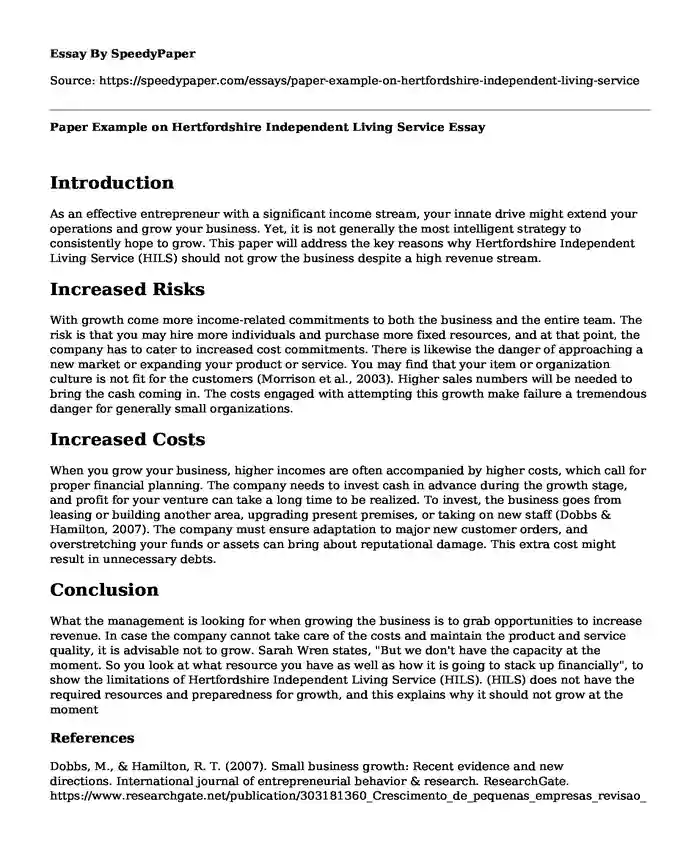Introduction
As an effective entrepreneur with a significant income stream, your innate drive might extend your operations and grow your business. Yet, it is not generally the most intelligent strategy to consistently hope to grow. This paper will address the key reasons why Hertfordshire Independent Living Service (HILS) should not grow the business despite a high revenue stream.
Increased Risks
With growth come more income-related commitments to both the business and the entire team. The risk is that you may hire more individuals and purchase more fixed resources, and at that point, the company has to cater to increased cost commitments. There is likewise the danger of approaching a new market or expanding your product or service. You may find that your item or organization culture is not fit for the customers (Morrison et al., 2003). Higher sales numbers will be needed to bring the cash coming in. The costs engaged with attempting this growth make failure a tremendous danger for generally small organizations.
Increased Costs
When you grow your business, higher incomes are often accompanied by higher costs, which call for proper financial planning. The company needs to invest cash in advance during the growth stage, and profit for your venture can take a long time to be realized. To invest, the business goes from leasing or building another area, upgrading present premises, or taking on new staff (Dobbs & Hamilton, 2007). The company must ensure adaptation to major new customer orders, and overstretching your funds or assets can bring about reputational damage. This extra cost might result in unnecessary debts.
Conclusion
What the management is looking for when growing the business is to grab opportunities to increase revenue. In case the company cannot take care of the costs and maintain the product and service quality, it is advisable not to grow. Sarah Wren states, "But we don't have the capacity at the moment. So you look at what resource you have as well as how it is going to stack up financially", to show the limitations of Hertfordshire Independent Living Service (HILS). (HILS) does not have the required resources and preparedness for growth, and this explains why it should not grow at the moment
References
Dobbs, M., & Hamilton, R. T. (2007). Small business growth: Recent evidence and new directions. International journal of entrepreneurial behavior & research. ResearchGate. https://www.researchgate.net/publication/303181360_Crescimento_de_pequenas_empresas_revisao_de_literatura_e_perspectivas_de_estudos/fulltext/57a9a51208ae659d1823b499/Crescimento-de-pequenas-empresas-revisao-de-literatura-e-perspectivas-de-estudos.pdf
Morrison, A., Breen, J., & Ali, S. (2003). Small business growth: intention, ability, and opportunity. Journal of Small Business Management, 41(4), 417-425.
https://doi.org/10.1111/1540-627X.00092.
Cite this page
Paper Example on Hertfordshire Independent Living Service. (2023, Dec 12). Retrieved from https://speedypaper.net/essays/paper-example-on-hertfordshire-independent-living-service
Request Removal
If you are the original author of this essay and no longer wish to have it published on the SpeedyPaper website, please click below to request its removal:
- Investment Essay Sample: Risk and Returns Analysis
- Free Essay on the Benefits of LPG Cars
- Free Essay: Biggest Challenges Managers Face Within the Organization
- Paper Example on the Financial Expertise of Audit Committees
- Free Essay: Database Modelling and Database Design
- Paper Example. Understanding Consumer and Business Buyer Behavior
- Effective Budgeting in Healthcare: Strategies & Tips - Essay Sample
Popular categories





